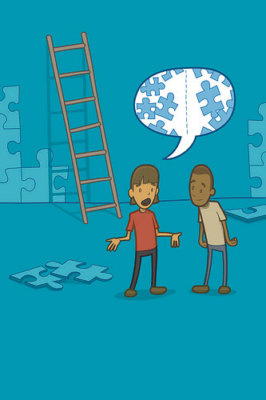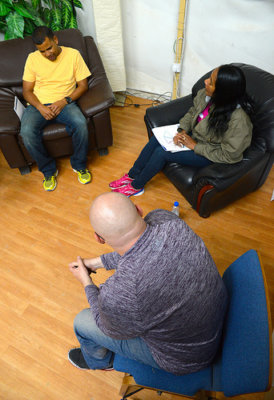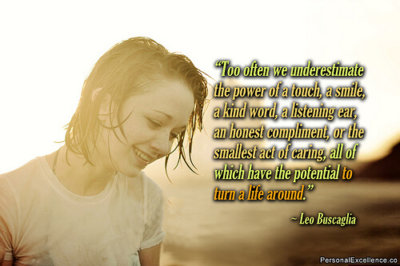Sympathy and Empathy – Do You Really Know the Difference?
by Andrea M. Darcy
Both empathy and sympathy are forms of having concern for another person. There seem to be varying definitions of what exactly the differences are. Dictionaries say one thing, but modern usage encompasses other angles.
In psychology, empathy is focussed on as more useful than sympathy. The term empathy was in fact created by pioneers of scientific psychology in the 1900s.
It’s very important for counsellors and psychotherapists that they extend empathy over sympathy to their clients.
Why is empathy so important? What is the meaning of empathy when used by psychologists? Why is empathy often seen as more empowering than sympathy? And how can you cultivate your capacity for empathy?
Empathy in psychology

By: Rosenfeld Media
Empathy in psychology involves actively working to share and comprehend the emotional state and experiences of another person.
Carl Rogers, one of the founders of humanistic psychology and the creator of person-centred therapy, felt that empathy is an integral ingredient of any understanding between two people, saying that-
empathy is ‘one of the most delicate and powerful ways we have of using ourselves’.
For Carl Rogers, when a therapist was being empathic, or using what he called “accurate empathic understanding”, certain elements had to be present. These were the following:
- the therapist has to be completely in the world of the other person
- they therapist has to be immersed in the present moment (empathy is in the here and now)
- the therapist has to sense the client’s inner workings and world ‘as if’ they were the therapist’s own, but without ever losing sight of the ‘as if’ or losing their own sense of self
So with with this framework in mind, let’s look at the difference between sympathy and empathy.
The downside to sympathy

By: Darren Kim
In its highest form, sympathy is meant to be a sort of compassion.
But the truth is that sympathy too often comes in its lower form – thinly disguised pity.
The result is often that the other person, despite your best intentions, often feels belittled.
Sympathy often leads to feelings of separation over a sense of shared humanity. You are the safe one, they the unlucky one. And we can feel disconnected from our place of luck and safety – can we really be friends with someone, we might secretly ask ourselves, with so much struggle in their lives?
In many ways sympathy can end up an unhelpful dead end. When we offer sympathy, we tend to say “I’m sorry”, or offer some unasked for advice. We might even use sympathy to end a conversation or feel once we’ve offered sympathy, we have the right to then change the topic. In this way sympathy doesn’t offer the other person any real support.
Sympathy can often leave us feeling and thinking disparagingly. Perhaps we think we are lucky, but then feel a little whisper in our mind that the world is a dangerous place and perhaps we’ll be next.
In other words, our act of sympathy can have quite a negative chain reaction.
Empathy vs sympathy

By: 143d ESC
Empathy, on the other hand, involves trying with great sincerity to understand what the other person is going through. We don’t feel sorry for them, we truly want to take the time to hear them through, and might even end up being in awe of their personal strength.
In other words, we listen to the other person. We might ask good questions as a way to understand them, and through answering them, the person might realise something about their situation that empowers them and helps them. So empathy is supportive and often useful.
By taking the time to listen and understand another’s situation or struggle, you might realise something about yourself, too. You might recognise something about the way you approach things or about your own personal strengths.
Or you might learn about another way of doing things or living that ends up useful to you in the future, either as you experience something similar or you end up meeting someone else you can share the knowledge with.
So empathy can be a positive chain reaction.
How to offer empathy
So how can you move from sympathy in empathy?
1. Really listen.
Listening almost seems a lost art in today’s modern world. We are all in such a rush, or we do what is more ‘competing’ than listening, simply waiting for a break in the conversation to share our similar story or our advice.
Real listening involves being totally present, not thinking about anything else than what the other is saying, and with no agenda but making sure that you understood them clearly.
2. Drop the advice.
Speaking of advice – it’s the enemy of empathy. The second you start telling another person how to think and feel then you aren’t trying to understand them but to trying to make yourself feel better. Empathy is not about you, it’s about the other. Worse, you are often judging them with your advice.
3. Recognise and allow emotions.
Empathy means seeing another person’s emotions as best as we can. So yes, this means letting someone cry instead of patting them on the back, going into sympathy and saying ‘poor you’, or trying to distract them with endless tissues. And it means letting someone rant instead of telling them to calm down. Remember, you are listening.
4. Ask powerful questions.
Sympathy often comes with advice. Empathy? Questions. A good question is one that empowers someone to find an answer that looks forward instead of getting caught up in self analysis. Learn more in our article on the power of good questions).
5. Be fully present.
We can’t be empathic if we are thinking about someone’s past or what they have said or done previously. Too often this means we are being judgemental, and empathy is about understanding, not analysing someone. And if we don’t try to understand someone when they are right in front of us sharing with us, but are busy filing away what they say for later when we can mull it over, it is not going to make them feel understood or supported.
When you let go of the past and present and just stay in the now moment with someone you offer them the gift of your presence. And this can be more powerful than any well-intentioned advice. It leaves the other feeling relevant, supported, and listened to.
6. Be authentic.
Sometimes, in our effort to understand another, we can start to lose our boundaries and slip into codependency. We listen, not to be empathic, but because we want to please the other person by making them feel good. We might even agree with what they are saying when really deep down it’s not something we think or feel.
Empathy is trying to understand someone, not trying to impress them. Being yourself, and experiencing your own emotions and responses as you extend empathy to another, then allows them to feel comfortable being more themselves and share more fully, allowing you to extend even more empathy. So the more authentic you are, the greater the opportunity to offer the gift of empathy.
 Andrea M. Darcy is a health and wellbeing expert, who has done some training in person-centred counselling and coaching. She often writes about trauma, relationships, and ADHD, and advises people on how to plan their therapy journey. Find her on Instagram @am_darcy
Andrea M. Darcy is a health and wellbeing expert, who has done some training in person-centred counselling and coaching. She often writes about trauma, relationships, and ADHD, and advises people on how to plan their therapy journey. Find her on Instagram @am_darcy





